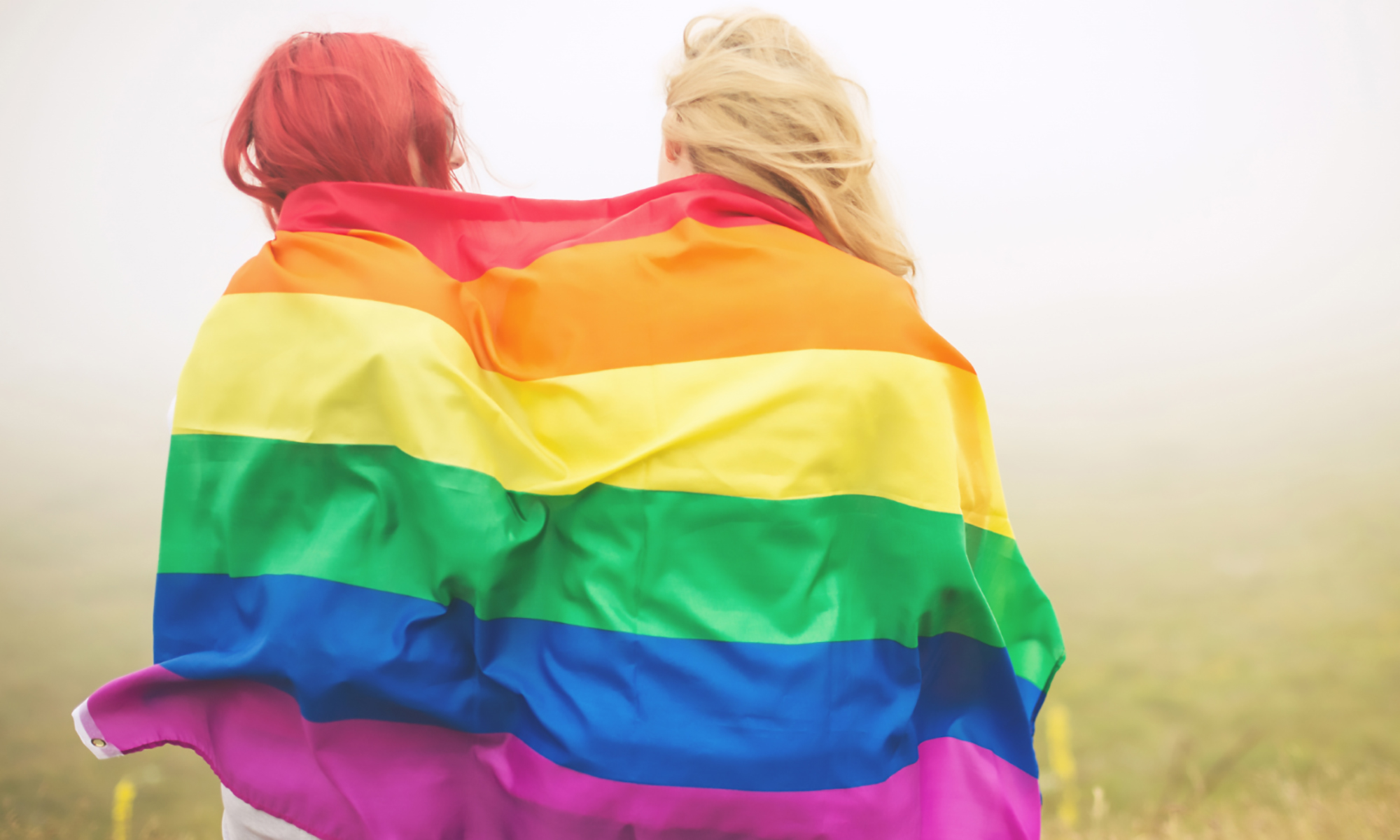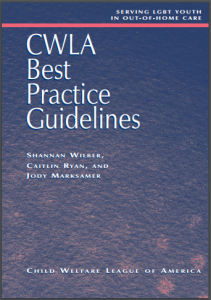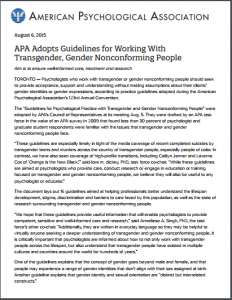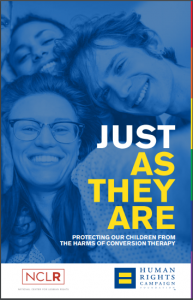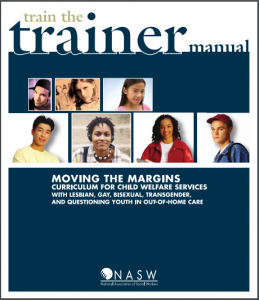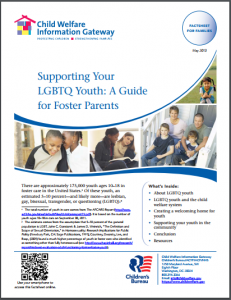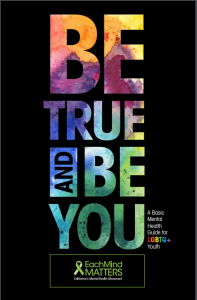 Written to youth and young adults to provide an overview of sexual orientation, gender identity and expression, coming out, LGBTQ+ and mental health, self-care, mental health services, and rights.
Written to youth and young adults to provide an overview of sexual orientation, gender identity and expression, coming out, LGBTQ+ and mental health, self-care, mental health services, and rights.
CWLA Best Practice Guidelines: Serving LGBTQ Youth in Out-of-Home Care
This easy-to-use resource contains the first-ever set of comprehensive professional guidelines for how child welfare and juvenile justice professionals can best serve LGBT youth in state care. The Best Practice Guidelines for Serving LGBT Youth in Out of Home Care developed out of recommendations from the Model Standards Project, a collaboration between Legal Services for Children and the National Center for Lesbian Rights.
Child Welfare League of America (2006)
Guidelines for Psychological Practice with Transgender and Gender Nonconforming People
Psychologists who work with transgender or gender nonconforming people should seek to provide acceptance, support and understanding without making assumptions about their clients’ gender identities or gender expressions, according to practice guidelines adopted during the American Psychological Association’s 123rd Annual Convention.
American Psychological Association (2015)
Just as They Are: Protecting Our Children from the Harms of Conversion Therapy
Lesbian, gay, and bisexual (LGB) youth within in welfare: Prevalence, risk and outcomes
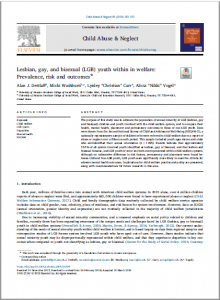 The purpose of this study was to estimate the population of sexual minority or LGB (lesbian, gay and bisexual) children and youth involved with the child welfare system, and to compare their health, mental health, placement and permanency outcomes to those of non-LGB youth. Data were drawn from the Second National Survey of Child and Adolescent Well-Being (NSCAW-II), a nationally representative sample of children who were referred to child welfare due to a report of abuse or neglect over a fifteen month period. Results indicate that approximately 15.5% of all system involved youth identified as lesbian, gay or bisexual, and that lesbian and bisexual females, and LGB youth of color are both overrepresented within child welfare systems. Although no substantive difference in risk factors, permanency and placement were found between LGB and Non-LGB youth, LGB youth were significantly more likely to meet the criteria for adverse mental health outcomes. Implications for child welfare practice and policy are presented, along with recommendations for future research in this area.
The purpose of this study was to estimate the population of sexual minority or LGB (lesbian, gay and bisexual) children and youth involved with the child welfare system, and to compare their health, mental health, placement and permanency outcomes to those of non-LGB youth. Data were drawn from the Second National Survey of Child and Adolescent Well-Being (NSCAW-II), a nationally representative sample of children who were referred to child welfare due to a report of abuse or neglect over a fifteen month period. Results indicate that approximately 15.5% of all system involved youth identified as lesbian, gay or bisexual, and that lesbian and bisexual females, and LGB youth of color are both overrepresented within child welfare systems. Although no substantive difference in risk factors, permanency and placement were found between LGB and Non-LGB youth, LGB youth were significantly more likely to meet the criteria for adverse mental health outcomes. Implications for child welfare practice and policy are presented, along with recommendations for future research in this area.
Los Angeles LGBT Center: Recognize. Intervene. Support. Empower (RISE)
RISE offers comprehensive care coordination through a Care Coordination Team (CCT). The CCT partners with families of LGBTQ youth ages 5 and older and focuses on barriers to permanency. RISE also includes an outreach and relationship-building component to support public and private agencies in working with LGBTQ youth. This component includes a three-hour LGBTQ foundation training, a three-hour social work practice with LGBTQ training for foster parents and kinship care, and organizational coaching.
Wilson et al, 2016
Mental Health of Transgender Children Who Are Supported in Their Identities
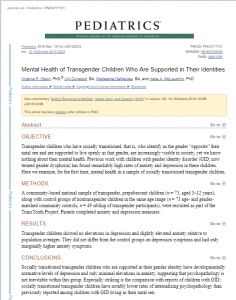 Transgender children who have socially transitioned, that is, who identify as the gender “opposite” their natal sex and are supported to live openly as that gender, are increasingly visible in society, yet we know nothing about their mental health. Previous work with children with gender identity disorder (GID; now termed gender dysphoria) has found remarkably high rates of anxiety and depression in these children. Here we examine, for the first time, mental health in a sample of socially transitioned transgender children. Results demonstrate that socially transitioned transgender children who are supported in their gender identity have developmentally normative levels of depression and only minimal elevations in anxiety, suggesting that psychopathology is not inevitable within this group. Especially striking is the comparison with reports of children with GID; socially transitioned transgender children have notably lower rates of internalizing psychopathology than previously reported among children with GID living as their natal sex.
Transgender children who have socially transitioned, that is, who identify as the gender “opposite” their natal sex and are supported to live openly as that gender, are increasingly visible in society, yet we know nothing about their mental health. Previous work with children with gender identity disorder (GID; now termed gender dysphoria) has found remarkably high rates of anxiety and depression in these children. Here we examine, for the first time, mental health in a sample of socially transitioned transgender children. Results demonstrate that socially transitioned transgender children who are supported in their gender identity have developmentally normative levels of depression and only minimal elevations in anxiety, suggesting that psychopathology is not inevitable within this group. Especially striking is the comparison with reports of children with GID; socially transitioned transgender children have notably lower rates of internalizing psychopathology than previously reported among children with GID living as their natal sex.
Moving the Margins: Training Curriculum for Child Welfare Services with LGBTQ Youth in Out-of-Home Care
This train-the-trainer curriculum includes a 101 and a 201 section. Aimed at increasing providers’ sensitivity and enhancing their skills, the modules within the curriculum provide definitions, values clarifications, and a learning lab on LGBTQ youth in out-of-home care.
National Association of Social Workers and Lambda Legal (Kelly & Clark, 2009)
Sharing Our Lived Experiences: Eight Tips for Understanding the Two-Spirit/LGBTQ Journey for Native Youth in the Child Welfare System
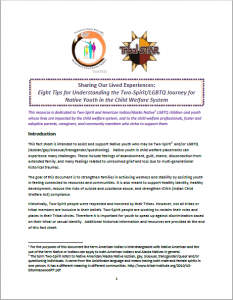 This fact sheet is intended to assist and support Native youth who may be Two-Spirit and/or LGBTQ (lesbian/ gay/ bisexual/ transgender/ questioning). Native youth in child welfare placements can experience many challenges, including feelings of abandonment, guilt, shame, disconnection from extended family, and many feelings related to unresolved grief and loss due to multi-generational historical traumas.
This fact sheet is intended to assist and support Native youth who may be Two-Spirit and/or LGBTQ (lesbian/ gay/ bisexual/ transgender/ questioning). Native youth in child welfare placements can experience many challenges, including feelings of abandonment, guilt, shame, disconnection from extended family, and many feelings related to unresolved grief and loss due to multi-generational historical traumas.
The goal of this document is to strengthen families in achieving wellness and stability by assisting youth in feeling connected to resources and communities. It is also meant to support healthy identity, healthy development, reduce the risks of suicide and substance abuse, and strengthen ICWA (Indian Child Welfare Act) compliance.
Supporting Your LGBTQ Youth: A Guide for Foster Parents
This guide is designed to improve foster parents’ skills in supporting LGBTQ youth in the child welfare system. The guide emphasizes the unique role that foster parents can play in reducing risks and stigma while improving youths’ health and well-being in the community.
Child Welfare Information Gateway
